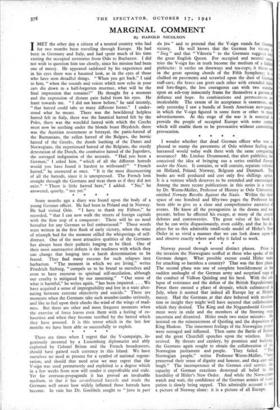Some months ago a diary was found upon the body
of a young German officer. He had been in Poland and in Norway. He had visited Oslo. " I have to thank my Fiihrer," he recorded, " that I can now walk the streets of foreign capitals with the firm step of a conqueror : There will be no need hereafter for any German to feel embarrassed." Those words were written in the first flush of early victory, when the wine of triumph had for the moment stilled the whisperings of self- distrust. One of the most attractive qualities of the Germans has always been their pathetic longing to be liked. One of their most unattractive defects is the readiness with which they can change that longing into a harsh determination to be feared. They find many excuses for such relapses into barbarism. " The moment in which we are living," writes Friedrich Sieliiirg, " compels us to be brutal to ourselves and even to have recourse to spiritual self-mutilation, although our cruelty is mitigated by our mourning." " Our sense of what is harmful," he writes again, " has been impaired. . . . We have acquired a sense of impregnability and live in a state alter- nating between extreme objectivity and suicide." There are moments when the Germans take such mumbo-jumbo seriously, and like to feel upon their cheeks the wind of the wings of mad- ness. But there are other and more frequent moments when the exercise of force leaves even them with a feeling of ex- haustion and when they become terrified by the hatred which they have aroused. It is this terror which in the last few months we have been able so successfully to exploit. * * * *


























 Previous page
Previous page